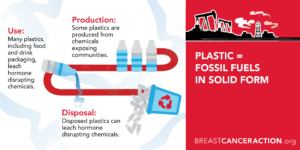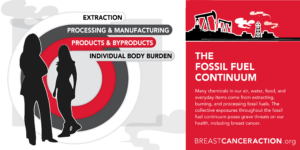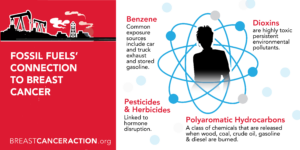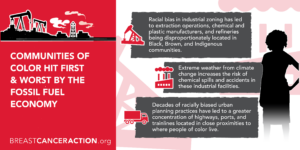If you think breast cancer and the global addiction to fossil fuels are two separate crises, think again. Fossil fuels take many forms, including oil, gasoline, diesel, natural gas, and coal. Many chemicals in our air, water, food, and everyday items come from extracting, processing, and burning fossil fuels. The use of fossil fuels not only contributes to climate change, but it may also increase our risk of developing breast cancer. We can be exposed to these harmful chemicals where we live, work, learn, and play from sources as varied as vehicle exhaust, industrial operations, pesticides, plastics, and many others.
There is a growing body of evidence that points to environmental links to breast cancer, including exposures to fossil fuel-based chemicals.
Exposures can come from each step in the fossil fuel continuum, extraction, processing and manufacturing, and products and by products. This all leads to a greater body burden that increases breast cancer risk.
Think breast cancer and the global addiction to fossil fuels are two separate crises? Think again.
Fossil fuels take many forms, including oil, gasoline, diesel, natural gas, and coal. Many chemicals in our air, water, food, and everyday items come from extracting, processing, and burning fossil fuels. The use of fossil fuels not only contributes to climate change, it may also increase our risk of developing breast cancer. We can be exposed to these harmful chemicals where we live, work, learn, and play from sources as varied as vehicle exhaust, industrial operations, pesticides, plastics, and many others.
Fossil fuels’ connection to breast cancer
 Every year in the U.S., more than a quarter of a million people are diagnosed with breast cancer—a number that continues to rise. Many of these people have no family history of the disease, which raises the question “What causes breast cancer?” Increasingly, researchers are finding environmental links to the disease, including exposures to fossil fuel-based chemicals.
Every year in the U.S., more than a quarter of a million people are diagnosed with breast cancer—a number that continues to rise. Many of these people have no family history of the disease, which raises the question “What causes breast cancer?” Increasingly, researchers are finding environmental links to the disease, including exposures to fossil fuel-based chemicals.
How are we exposed?
Exposures can come from each step in the fossil fuel continuum, all leading to a greater body burden that increases breast cancer risk:
 Extraction: There are many ways to extract fossil fuels, including fracking, oil drilling (on land and offshore) and coal mining. Each of these expose people to a range of toxic chemicals. For example, chemicals that are linked to breast cancer are used in the fracking process.
Extraction: There are many ways to extract fossil fuels, including fracking, oil drilling (on land and offshore) and coal mining. Each of these expose people to a range of toxic chemicals. For example, chemicals that are linked to breast cancer are used in the fracking process.What are some chemical exposures from fossil fuels that may increase breast cancer risk?
 Benzene is a known carcinogen and may increase breast cancer risk. Common exposure sources include gasoline stored for use in lawn mowers, and cars in basements or garages attached to a house; auto and truck exhaust; and solvents used in the workplace. Benzene released during fossil fuel extraction exposes workers and neighboring communities.
Benzene is a known carcinogen and may increase breast cancer risk. Common exposure sources include gasoline stored for use in lawn mowers, and cars in basements or garages attached to a house; auto and truck exhaust; and solvents used in the workplace. Benzene released during fossil fuel extraction exposes workers and neighboring communities.Communities of Color Hit First & Worst by the Fossil Fuel Economy
 Black, Brown, and Indigenous communities are systematically harmed by fossil fuel industry operations. This harm arises from historic and ongoing planning, zoning, and lending practices that lead to communities of color being disproportionately exposed to high levels of air, water, and soil pollution.
Black, Brown, and Indigenous communities are systematically harmed by fossil fuel industry operations. This harm arises from historic and ongoing planning, zoning, and lending practices that lead to communities of color being disproportionately exposed to high levels of air, water, and soil pollution.
A transition from fossil fuel dependence to renewable energy and non-toxic products can create economic opportunity. People of color must have control over policies that affect how solutions are developed and must benefit from the economic opportunities generated by the transition to healthier, safer alternatives.
What is Breast Cancer Action doing about the link between fossil fuels and breast cancer?
To end the breast cancer epidemic, we must turn off the tap on the fossil fuel economy. Cancer diagnoses continue to increase, yet only around 15 percent of all breast cancers are linked to family history. It’s time to end exposure to cancer-causing chemicals, hormone disruptors, and other chemicals of concern throughout the fossil fuel continuum.
BCAction is working to eliminate harmful exposures from fossil fuels by disrupting the fossil fuel continuum. We are proud members of the California-based Last Chance Alliance, a coalition working to end fossil fuel projects, including fracking, in California.
We encourage members to join us in taction by learning more.
Fact sheet: Why We Must Stop Fossil Fuels
Why We Must Stop Fossil Fuel Infographics
Webinar: The Fossil Fueled Health Crisis
Blog Post: Cal-GEM Public Rule Making Hearing
Fact sheet: Breast Cancer and Fracking
Please contact Breast Cancer Action at info@bcaction.org with questions or to request references.